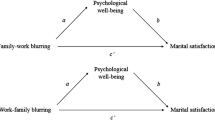Abstract
The ability to balance work and family demands can affect marital satisfaction, family cohesion, and job satisfaction. While most research in this area has utilized middle-class Anglo-American samples, the present investigation examined dual-earner, working-class Mexican- Americans. Positive relationships were found between work-family balance and satisfaction with marriage, family life and jobs with gender and acculturation showing moderating effects on some variables. Family therapists should be cognizant of the impact of work- family demands on marriage and family functioning even when working class minority families do not offer these issues as presenting problems.
Similar content being viewed by others
REFERENCES
Bersoff, D., & Crosby, F. (1984). Job satisfaction and family status. Personality and Social Psychology Bulletin, 10 (1), 79–83.
Beutell, N. J.,& Wittig-Berman, U. (1999). Predictors of work-family conflict and satisfaction with family, job, career, and life. Psychological Reports, 85, 893–903.
Campbell-Clark, S. (2000). Work/family border theory: A new theory of work/family balance. Human Relations, 53, 747–770.
Del Campo, R., & Del Campo, D. (2002). Employee assistance programs. Annals of the American Psychotherapy Association, May/June,15–18.
Duxbury, L.,Higgins, C.,& Lee, C. (1994). Work-Family conflict: A comparison by gender, family type, and perceived control. Journal of Family Issues, 15, 449–466.
Greenhaus, J. H., Bedeian, A.G., & Mossholder, K.W. (1987). Work experiences, job performance, and feelings of personal and family well-being. Journal of Vocational Behavior, 31, 200–215.
Hendrick, S. (1988). A generic measure of relationship satisfaction. Journal of Marriage and the Family, 50, 93–98.
Heymann, S. J., & Earle, A. (1998). The work-family balance: What hurdles are parents leaving welfare likely to confront? Journal of Policy Analysis and Management, 17, 313–321.
Kinnuner, U., Gerris, J., & Vermulst, A. (1996). Work experiences and family functioning among employed fathers with children of school age. Family Relations, 45, 449–455.
Lambert, S. J. (1990). Processes linking work and family: A critical review and research agenda. Human Relations, 43, 239–257.
Larson, J.H., Wilson, S.M., & Beley, R. (1994). The impact of job insecurity on marital and family relationships. Family Relations, 43, 138–143.
Leiter, M. P., & Durup, M. J. (1996). Work, home, and in-between: A longitudinal study of spillover. Journal of Applied Behavioral Science, 32(1), 29–47.
Norton, R. (1983). Measuring marital quality: A critical look at the dependent variable. Journal of Marriage and the Family, 45, 141–151.
Perrone, K. M., & Worthington, E. L., Jr. (2001). Factors influencing ratings of marital quality by individuals within dual-career marriages: A conceptual model. Journal of Counseling Psychology, 48(1), 3–9.
Schuessler, K.F. (1982). Measuring social life feelings. San Francisco: Jossey-Bass.
Soto-Fulp, S. & Del Campo, R. (1994). Structural family therapy with Mexican American family systems. Contemporary Family Therapy, 16, 349–361.
Thomas, L.T., & Ganster, D. C. (1995). Impact on family-supportive work variables on work-family conflict and strain: A control perspective. Journal of Applied Psychology 80, 6–15.
Tiedje, L. B., & Wortman, C. B. (1990). Women with multiple roles: Role-compatibility perceptions, satisfaction, and mental health. Journal of Marriage and the Family, 52, 63–73.
United States Census Bureau (2000). http://www.census.gov
Author information
Authors and Affiliations
Rights and permissions
About this article
Cite this article
Barnett, K.A., Del Campo, R.L., Del Campo, D.S. et al. Work and Family Balance Among Dual-Earner Working-Class Mexican-Americans: Implications for Therapists. Contemporary Family Therapy 25, 353–366 (2003). https://doi.org/10.1023/A:1027395901282
Issue Date:
DOI: https://doi.org/10.1023/A:1027395901282




